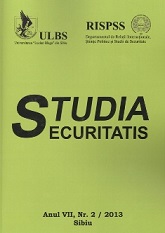SOME THEORETICAL GROUNDS ON INFORMATION SECURITY: AGENDA SETTING IN THE MEDIA COMMUNICATION THEORIES
CÂTEVA FUNDAMENTE TEORETICE ALE SECURITĂȚII INFORMAȚIONALE: AGENDA SETTING ÎN CONTEXTUL TEORIILOR COMUNICĂRII MEDIATICE
Author(s): Victor Moraru, Mariana TacuSubject(s): Politics / Political Sciences
Published by: Editura Universitatii LUCIAN BLAGA din Sibiu
Keywords: Information Security; Agenda Setting; Communication Theories, Public Opinion
Summary/Abstract: The constant development of agenda-setting phenomenon is conditioned by the studies realized by researchers and practitioners of mass communication and not only, who argue that the dynamics of contemporary society are defined by the activity of media institutions, by the reflection of reality and exposure to certain events in the foreground. The media dependence can be explained by connecting the informational media messages and the emotional needs of social subjects. The similarities between the three families of theories about media effects are limited to one main purpose: to be informed, to inform, to influence, to influence and act accordingly. The distinction lies in the detailed analysis of the study period, which brings into question: the intellectual level, the cultural level, the options, the common and personal goals. Relevance of agenda setting models for information security is significant in terms of building / deforming public opinion, inducing false or irrelevant issues, revealing or increasing awareness of the real or not sufficiently grounded issues inoculated into public opinion, in order to get current opinion and may even raise the pro-or anti-system movements.
Journal: Studia Securitatis
- Issue Year: 2013
- Issue No: 2
- Page Range: 117-126
- Page Count: 10
- Language: Romanian
- Content File-PDF

